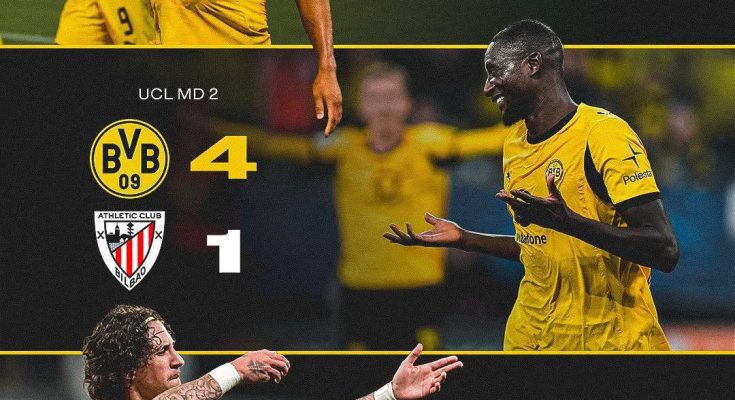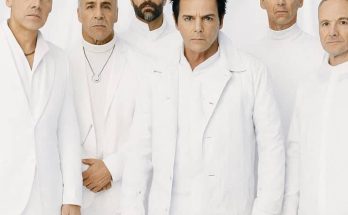The first club in the history of the UEFA Champions League who scored is FC Barcelona. In the 2024-25 season under coach Hansi Flick, Barça recorded three straight Champions League games in which they netted at least four goals, thereby equalling a feat previously achieved only in the 1959-60 European Cup era.
To break it down: Barça’s run began after an opening-fixture loss to AS Monaco. They then defeated Young Boys Bern 5-0 and Bayern Munich 4-1, followed by a 5-2 victory away to Crvena Zvezda. This sequence marked Barça’s third consecutive UCL match scoring four or more goals—something they hadn’t accomplished in the Champions League era until then
What makes the achievement stand out is not just the volume of goals, but the consistency: scoring four-plus in three straight matches is rare in Europe’s top club competition, where defenses are strong and margin for large-score games narrower. For Barça it signified a potent attacking phase, and for football history it underlined that even elite-level clubs can still surprise with such bursts.
In looking at the significance, several points emerge. First, it shows a team not merely winning but dominating — when a club racks up four or more goals in a match, it isn’t just edging out the opponent; it is asserting superiority. To do that three times in a row at the Champions League level speaks to a sweet combination of tactical clarity, individual finishing, depth of squad, and momentum. Under Hansi Flick, Barça evidently found the right mix: attacking players on form, matches where the opposition couldn’t stem the flow, and the confidence that comes with earlier success in the sequence.
Second, the historic context deepens the feat. The previous instance involving Barça in the 1959-60 European Cup was with legends such as László Kubala, Luis Suárez (Spanish footballer) and Ferran Olivella; rewriting or equalling that legacy more than six decades later suggests the club has returned to a scale of attacking potency rarely seen. (FCBN)
Third, one must consider the broader competitive environment. Modern Champions League football involves more matches, more robust opposition, deep squads, and little room for error. Early group-stage games may provide opportunities, but for a big club to string together three such high-scoring games means dealing with rotation, varying competition levels, and maintaining a high level of execution. That Barça achieved this speaks directly to how their season was shaped: attack-focused, dominant, and consistently delivering.
Fourth, from a psychological standpoint, such streaks feed on themselves. When a team hits four goals in one match, players gain confidence, opposition becomes wary, and momentum builds. In a tournament like the Champions League, where group phases often decide seeding or knockout qualification, building momentum early helps. For Barça, securing big wins meant better positioning, possibly more favourable draws, and a mindset shift from “survive and advance” to “dominate”. That mindset can make the difference in tight knockout ties later on.
Fifth, for opponents and neutral observers, what this sequence says is that scoring four goals is no longer solely a “blow-out” rarity reserved for only the very top side against a weak one. It signals that the elite club here has chosen to press the attack, to impose playing style rather than settle for incremental victories. In that sense, Barça’s run became symbolic of modern attacking football: high press, fluid forward movement, multiple goal threats, and finishing ruthlessness.
In terms of tactical underpinnings, while I won’t claim full inside knowledge of all three matches, it is reasonable to infer several contributing factors. The forward and midfield lines must have been aligned; attackers likely enjoyed freedom, space and service. The opposition teams might have had vulnerabilities—perhaps slower build-up, defensive lapses, less depth—but exploiting them repeatedly suggests intentional strategy rather than mere luck. With the coaching staff setting up a system where threats come from different positions, opposition defenses cannot simply lock down one style. In turn, that diversity of threat helps explain consistent high-scoring games rather than one-off outburst.
From a historical-record viewpoint, this run places Barça among the most exciting offensive sides in Champions League history. Although other clubs and matches have seen astonishing single-game scores (for example five or six goals by one side), to do so consistently in successive matches is rare. In fact, the record is framed as “first club … to score four or more goals in three consecutive UCL matches” (in this modern era) for Barça. That underlines their capability and adds to their legacy: not only winning titles but producing memorable attacking sequences.
It’s interesting to reflect on possible variables around this feat. For example: Were the three consecutive games in the group stage or extended into knockout rounds? From the sources, the run appears to have been in the group/league phase of the competition. This matters: group-stage matches sometimes allow more open play, especially if one side is stronger than another. But even within group stages, Champions League level is high and opponents are European top teams, so it remains impressive. Additionally, the timing: the first match in that run followed a loss, meaning Barça had to rebound from a setback, and then responded with dominant wins. That rebound aspect adds extra merit: not only sustained excellence but capacity to respond to adversity.
For fans of the club and football purists alike, records of this type enrich the narrative of a season. It tells of a stadium atmosphere electrified by goals, of forwards celebrating repeatedly, of opposition defenses under siege. It also sets a tone—as the season progresses, opponents are aware of the threat, and games become psychologically tricky: they come to defend, but the team on the front foot (here Barça) sets the terms. Thus such sequences often shift more than just immediate results; they shift opponent behaviour, tournament momentum, and even fan expectations.
It’s worth noting the limitations and what the record does not guarantee. Scoring four or more in three straight games is a mark of attacking dominance but not necessarily a guarantee of eventual trophy success. Football remains unpredictable; even dominant group-stage performances must transition into knockout consistency, where single moments often decide matches. Furthermore, scoring many goals may sometimes mask defensive vulnerabilities—if a team is scoring freely but also conceding, then the narrative is incomplete. Yet in this case, the headline is purely about the scoring sequence and what it signifies: a club at that moment was firing on all cylinders offensively.
From a broader perspective in football analytics, this kind of record speaks to “peak phases” of teams — periods when tactical, physical, psychological, and personnel factors align. Teams often go through cycles: rebuilding, consolidation, peak attack or defence. Barça’s run indicates they were in an “attack peak” phase. It offers benchmarks for other clubs: how many goals, over how many matches, constitutes “dominant run”. For analytics departments, running metrics like goals per game, xG (expected goals), shots per game, and conversion rates often reveal that sustained high output requires more than luck — it requires structural excellence.
It also offers inspiration for coaches, players and clubs: a reminder that attacking aspirations pay off. Plenty of teams play conservatively in the Champions League, valuing margin safety over goal volume. But when a club can unleash attacking force while still managing tournament demands, the rewards are both statistical and narrative: big wins, global attention, and legacy moments.
In conclusion, the first club to accomplish three consecutive Champions League matches each scoring four or more goals was FC Barcelona under Hansi Flick in the 2024-25 season. That feat places them in the history books not just for triumphs but for the way they played: boldly, expansively, ruthlessly. It underlines what makes the Champions League special: when an elite club decides to dominate and backs that decision with execution. For Barça, for their fans, for football historians, this run will be remembered as a highlight of attacking excellence—and for other teams, a challenging benchmark to chase.



